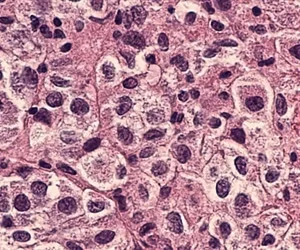| Antibodies - Sartobind® Rapid A Lab: Revolutionizing Antibody Purification |
|
|
|
|
| |

|
|
| |
The latest antibodies news from News Medical |
|
|
|
| |
 Solving Complex Stoichiometry: Antibody-Protein-Detergent Interactions Solving Complex Stoichiometry: Antibody-Protein-Detergent Interactions
Binding stoichiometry is a crucial piece of information but is often inaccurate due to measurement bias. This case study tackles the challenge by using size-exclusion chromatography coupled with multi-angle light scattering (SEC-MALS) to measure the stoichiometry of an antibody fragment, membrane protein, and detergent complex
| |
|
|
| |  | | |  Researchers investigate antibody-dependent complement activation during Klebsiella pneumoniae infection. Researchers investigate antibody-dependent complement activation during Klebsiella pneumoniae infection. | | | | |  A new cell therapy, targeting CD7 on leukaemia cells, gives a potentially effective treatment for patients with T-cell acute lymphoblastic leukaemia (T-ALL) who have exhausted all standard treatment options. A new cell therapy, targeting CD7 on leukaemia cells, gives a potentially effective treatment for patients with T-cell acute lymphoblastic leukaemia (T-ALL) who have exhausted all standard treatment options. | | | | |  In neuroscience, antibodies are essential for investigating neurodegenerative disorders, facilitating early diagnosis and potential therapeutic interventions. In neuroscience, antibodies are essential for investigating neurodegenerative disorders, facilitating early diagnosis and potential therapeutic interventions. | | | | |  Antibody profiling tools enhance immunology research, offering insights into humoral responses and vaccine efficacy through high-throughput antigen analysis. Antibody profiling tools enhance immunology research, offering insights into humoral responses and vaccine efficacy through high-throughput antigen analysis. | | | | |  Monoclonal antibodies (mAbs) are used to prevent, detect, and treat a broad spectrum of non-communicable and communicable diseases. Over the past few years, the market for mAbs has grown exponentially with an expected compound annual growth rate (CAGR) of 11.07% from 2024 (237.64 billion USD estimated at the end of 2023) to 2033 (679.03 billion USD expected by the end of 2033). Monoclonal antibodies (mAbs) are used to prevent, detect, and treat a broad spectrum of non-communicable and communicable diseases. Over the past few years, the market for mAbs has grown exponentially with an expected compound annual growth rate (CAGR) of 11.07% from 2024 (237.64 billion USD estimated at the end of 2023) to 2033 (679.03 billion USD expected by the end of 2033). | | | | |  Integral Molecular, a leader in antibody discovery and characterization, has published new research in the journal mAbs, revealing that as many as one-third of antibody-based drugs exhibit nonspecific binding to unintended targets. Integral Molecular, a leader in antibody discovery and characterization, has published new research in the journal mAbs, revealing that as many as one-third of antibody-based drugs exhibit nonspecific binding to unintended targets. | | | | |  In the fight against cancer, chimeric antigen receptor T cell (CAR-T) therapy has achieved notable success in treating blood cancers. However, it has been largely ineffective against solid tumors. In the fight against cancer, chimeric antigen receptor T cell (CAR-T) therapy has achieved notable success in treating blood cancers. However, it has been largely ineffective against solid tumors. | | | | |  A new review by Dr. Ruyuan Wang and an international team of researchers explores the complex interactions between the innate and adaptive immune systems, shedding light on regulatory mechanisms in infection, cancer, and autoimmune diseases. A new review by Dr. Ruyuan Wang and an international team of researchers explores the complex interactions between the innate and adaptive immune systems, shedding light on regulatory mechanisms in infection, cancer, and autoimmune diseases. | |
|
|
|
|
|
|
|